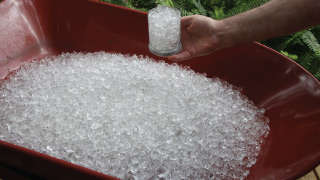
Organic FarmingKrushi jivan
Use of Hydrogels in Agriculture and its Benefits
Rainfall in various areas is irregular due to a fluctuating climate and the time between two showers is also increasing. Adequate water is available for irrigation due to lack of rainfall. The hydrogel developed by the Indian Agricultural Research Institute may prove a boon to avoid crop losses due to irregular rainfall.
What is hydrogel?
Hydrogel is a mixed cross-link substance made up of atoms. It is a white grain-like substance formed by a chemical process. After exposure to water, it is converted into a gel and soaked 350–500 times its weight and sticks to the root of the plant and moistens the crop as necessary. There is no adverse effect of soil fertility with hydrogels.
Benefit:
• Seed tends to grow quickly.
• Provides the seed with nitrogen for longer storage.
• Conserve up to 40-60% of water and nutrients.
• Protects plants from fungi and other pathogens.
• Reduces planting costs.
• Helps to develop roots.
Method of use:
• It is recommended to provide 1 to 1.5 kg/acre of hydrogel seed at the time of sowing in the soil; 2.5 kg/acre is advisable if the sand is high.
• Combine the seeds and place them directly in the soil. For better results, apply 1 kg of hydrogel and 10 kg of soil and sow with seed.
Source: Krushi jivan
If you find this information useful then do not forget to Like and Share with other farmer friends.
644
8

